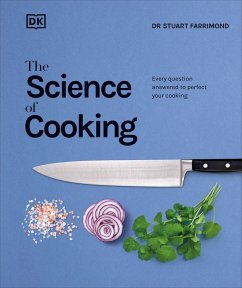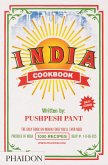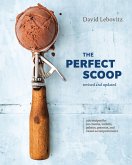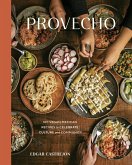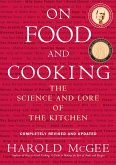18,86 €
inkl. MwSt.
Sofort lieferbar

9 °P sammeln
- Gebundenes Buch
- Merkliste
- Auf die Merkliste
- Bewerten Bewerten
- Teilen
- Produkt teilen
- Produkterinnerung
- Produkterinnerung
It's time to bring food science out of the lab and into your kitchen!
Which vegetables should you eat raw? How do you make the perfect poached egg? And should you keep your eggs in the fridge? Why does chocolate taste so good? Is it OK to reheat cooked rice? How do I cook the perfect steak or make succulent fish every time? TV personality, food scientist and bestselling author, Dr. Stuart Farrimond answers all these questions and more with The Science of Cooking - equipping you with the scientific know-how to take your cooking to new levels.
Explore fundamental culinary concepts,…mehr
Andere Kunden interessierten sich auch für
![India India]() Pushpesh PantIndia47,34 €
Pushpesh PantIndia47,34 €![Fäviken: 4015 Days, Beginning to End Fäviken: 4015 Days, Beginning to End]() Magnus NilssonFäviken: 4015 Days, Beginning to End43,23 €
Magnus NilssonFäviken: 4015 Days, Beginning to End43,23 €![Night + Market Night + Market]() Kris YenbamroongNight + Market40,99 €
Kris YenbamroongNight + Market40,99 €![The Perfect Scoop The Perfect Scoop]() David LebovitzThe Perfect Scoop18,71 €
David LebovitzThe Perfect Scoop18,71 €![Provecho Provecho]() Edgar CastrejónProvecho23,99 €
Edgar CastrejónProvecho23,99 €![Death by Black Hole Death by Black Hole]() Neil Degrasse TysonDeath by Black Hole12,99 €
Neil Degrasse TysonDeath by Black Hole12,99 €![On Food and Cooking On Food and Cooking]() Harold McGeeOn Food and Cooking60,99 €
Harold McGeeOn Food and Cooking60,99 €-
-
-
-
-
-
-
-
-
-
-
-
-
It's time to bring food science out of the lab and into your kitchen!
Which vegetables should you eat raw? How do you make the perfect poached egg? And should you keep your eggs in the fridge? Why does chocolate taste so good? Is it OK to reheat cooked rice? How do I cook the perfect steak or make succulent fish every time? TV personality, food scientist and bestselling author, Dr. Stuart Farrimond answers all these questions and more with The Science of Cooking - equipping you with the scientific know-how to take your cooking to new levels.
Explore fundamental culinary concepts, practical advice and step-by-step techniques, to bring food science out of the lab and into your kitchen. Find the answers to your cookery questions and get more out of recipes with intriguing chapters covering all major food types from meat, poultry and seafood, to grains, vegetables, and herbs.
Perfect your cooking with practical instruction and the science behind it, as you explore:
- Step-by-step techniques to demonstrate key concepts in a clear manner
- Striking illustrations are featured throughout to highlight key culinary processes
- Scientific concepts organised by food group and ingredient
- Question-and-answer format to make science relevant to everyday cooking
A good recipe goes a long way, but if you can master the science behind it, you'll be one step ahead! The Science of Cooking shows you how by bringing food science out of the lab and into your kitchen, providing you with all the scientific information you need to take your home cooking to a whole new, more nutritious level! From making great risotto and soft ice cream to the process of steaming, this gastronomic cookbook includes step-by-step techniques and striking 3D graphics to bring culinary facts to life.
A must-have cooking gift for anyone interested in the culinary arts, whether you're a hobby cook at the beginning of your learning, seeking to cook more intuitively, or you love science and learning about it's everyday applications, this is a great volume for anybody interested in food and nutrition generally, doubling up as a lovely coffee table book for the whole family to explore and love!
At DK, we believe in the power of discovery.
So why stop there? This series from DK is designed to help you perfect your cooking with practical instruction - and the science behind it. There are more cookbooks to discover from The Science of... series giving you the essentials to cook up a storm! Explore the science behind the art of making incredible spice blends with The Science of Spice paired together they make the ideal cookery gifts for your food-loving friends too!
Which vegetables should you eat raw? How do you make the perfect poached egg? And should you keep your eggs in the fridge? Why does chocolate taste so good? Is it OK to reheat cooked rice? How do I cook the perfect steak or make succulent fish every time? TV personality, food scientist and bestselling author, Dr. Stuart Farrimond answers all these questions and more with The Science of Cooking - equipping you with the scientific know-how to take your cooking to new levels.
Explore fundamental culinary concepts, practical advice and step-by-step techniques, to bring food science out of the lab and into your kitchen. Find the answers to your cookery questions and get more out of recipes with intriguing chapters covering all major food types from meat, poultry and seafood, to grains, vegetables, and herbs.
Perfect your cooking with practical instruction and the science behind it, as you explore:
- Step-by-step techniques to demonstrate key concepts in a clear manner
- Striking illustrations are featured throughout to highlight key culinary processes
- Scientific concepts organised by food group and ingredient
- Question-and-answer format to make science relevant to everyday cooking
A good recipe goes a long way, but if you can master the science behind it, you'll be one step ahead! The Science of Cooking shows you how by bringing food science out of the lab and into your kitchen, providing you with all the scientific information you need to take your home cooking to a whole new, more nutritious level! From making great risotto and soft ice cream to the process of steaming, this gastronomic cookbook includes step-by-step techniques and striking 3D graphics to bring culinary facts to life.
A must-have cooking gift for anyone interested in the culinary arts, whether you're a hobby cook at the beginning of your learning, seeking to cook more intuitively, or you love science and learning about it's everyday applications, this is a great volume for anybody interested in food and nutrition generally, doubling up as a lovely coffee table book for the whole family to explore and love!
At DK, we believe in the power of discovery.
So why stop there? This series from DK is designed to help you perfect your cooking with practical instruction - and the science behind it. There are more cookbooks to discover from The Science of... series giving you the essentials to cook up a storm! Explore the science behind the art of making incredible spice blends with The Science of Spice paired together they make the ideal cookery gifts for your food-loving friends too!
Produktdetails
- Produktdetails
- Verlag: Dorling Kindersley UK
- Artikelnr. des Verlages: 382375
- Seitenzahl: 256
- Erscheinungstermin: 5. Oktober 2017
- Englisch
- Abmessung: 265mm x 220mm x 30mm
- Gewicht: 1362g
- ISBN-13: 9780241229781
- ISBN-10: 0241229782
- Artikelnr.: 47796980
- Herstellerkennzeichnung
- Libri GmbH
- Europaallee 1
- 36244 Bad Hersfeld
- gpsr@libri.de
- Verlag: Dorling Kindersley UK
- Artikelnr. des Verlages: 382375
- Seitenzahl: 256
- Erscheinungstermin: 5. Oktober 2017
- Englisch
- Abmessung: 265mm x 220mm x 30mm
- Gewicht: 1362g
- ISBN-13: 9780241229781
- ISBN-10: 0241229782
- Artikelnr.: 47796980
- Herstellerkennzeichnung
- Libri GmbH
- Europaallee 1
- 36244 Bad Hersfeld
- gpsr@libri.de
Dr Stuart Farrimond
- 1: Foreword
- 2: Taste and flavour
- 1: Why do we cook?
- 2: How do we taste?
- 3: Why does cooked food taste so good?
- 4: Why do some flavours go together so well?
- 3: Kitchen essentials
- 1: An essential guide to knives
- 2: An essential guide to pots and pans
- 3: An essential guide to utensils
- 4: Meat and poultry
- 1: In focus: meat
- 2: How can I tell if meat is good quality?
- 3: Should I avoid buying meat that has gone brown?
- 4: Why do different meats look and taste so different?
- 5: Is it better to choose organic meat?
- 6: Are purebred and heritage cattle breeds tastier?
- 7: Do larger chickens lack flavour?
- 8: How can an animal's feed affect the taste and texture of its meat?
- 9: Is fillet steak from the tenderloin really the best cut of beef?
- 10: Why is it so expensive to buy Wagyu beef?
- 11: What is the difference between organic, free-range, and indoor chickens?
- 12: How can I tell if meat has been injected with water?
- 13: If I freeze meat, will it destroy the taste and texture?
- 14: Do I really need to pound meat?
- 15: The process of barbecuing
- 16: What are the benefits of marinating meat?
- 17: Should I season meat with salt well in advance or just before cooking?
- 18: How do I smoke meat at home?
- 19: Is it possible to age meat at home?
- 20: Should I trim all the fat off meat?
- 21: Does it matter if you cut meat across the grain or along it?
- 22: What is the secret to perfectly crispy pork crackling?
- 23: Should I cook meat from room temperature?
- 24: Does searing a steak really "seal in" juices?
- 25: How do I cook the perfect steak?
- 26: The process of slow cooking
- 27: How can I stop chicken or turkey from drying out?
- 28: What does basting do?
- 29: How can I tell when meat is done?
- 30: Why do I need to rest meat after cooking?
- 31: What can I do with overcooked meat?
- 32: What's the secret of a tasty sauce?
- 33: Is it worth all the effort to make my own stock?
- 34: Why is it safe to eat rare beef, but not chicken or pork?
- 35: Why do so many foods taste like chicken?
- 5: Fish and seafood
- 1: In focus: fish
- 2: How do I know if fish is fresh?
- 3: Why is fish called "brain" food?
- 4: Why does salmon come in varying shades of orange?
- 5: Is farmed fish as good as wild?
- 6: Is it better to buy prawns with their heads on?
- 7: Is it better to buy prawns raw or pre-cooked, fresh or frozen?
- 8: Why do we eat oysters raw?
- 9: When is the best season for oysters?
- 10: The process of pan-frying
- 11: How can I preserve fish at home?
- 12: What happens when you salt bake fish?
- 13: Is it better to buy fresh or frozen fish?
- 14: Can I cook fish from frozen?
- 15: Should I bake fish in a parcel or uncovered?
- 16: How can I keep fish moist with different cooking methods?
- 17: Can fish go soggy if poached slowly?
- 18: The process of sous-vide
- 19: How do I cook fish to have crispy golden skin?
- 20: Why don't you need to rest fish?
- 21: Can I eat sashimi safely?
- 22: How does citrus juice "cook" raw fish?
- 23: Why do shellfish change colour when cooked?
- 24: What are the rules when cooking mussels?
- 6: Eggs and dairy
- 1: In focus: eggs
- 2: Should I limit how many eggs I eat?
- 3: Are there more nutrients in free-range eggs?
- 4: Is it safe to eat raw eggs?
- 5: Where is the best place to store my eggs?
- 6: Why do rotten eggs smell bad?
- 7: How can I tell if an egg is fresh?
- 8: Is it true that only fresh eggs poach well?
- 9: How can I cook soft-boiled eggs with runny yolks?
- 10: What's the best method to peel hard-boiled eggs?
- 11: How do I make the perfect scrambled eggs?
- 12: What is the secret of creamy, smooth custard?
- 13: Does it matter if yolk gets in my whipped egg whites?
- 14: How can I prevent split mayonnaise?
- 15: In focus: milk
- 16: Why do we pasteurize milk?
- 17: Can I cook successfully with low-fat dairy products?
- 18: Which type of cream should I use?
- 19: How can I heat milk without a skin forming?
- 20: Can I make ice cream at home without an ice-cream maker?
- 21: Do ice-cream makers make creamier ice cream than whisking by hand?
- 22: Is it worth making my own yogurt?
- 23: Why does yogurt split in spicy dishes?
- 24: Should I eat probiotic yogurt?
- 25: In focus: cheese
- 26: If the veins in blue cheese are mould, why is it edible?
- 27: Why are some cheeses so strong and smelly?
- 28: Why does some cheese go stringy?
- 29: Should I avoid processed cheese?
- 30: Can I make perfect soft cheese at home?
- 7: Rice, grains, and pasta
- 1: In focus: rice
- 2: How much water should I add to my rice?
- 3: How can I cook fluffy rice every time?
- 4: Is it okay to reheat cooked rice?
- 5: The process of pressure cooking
- 6: Why is wholegrain better than processed?
- 7: Do I really need to soak pulses before I cook them?
- 8: Why exactly is quinoa so special?
- 9: How can I stop beans giving me gas?
- 10: Is it true that uncooked kidney beans are poisonous?
- 11: Why does popcorn pop?
- 12: How can I make my own fresh pasta?
- 13: Is fresh pasta better than dried?
- 14: How does adding salt to my pasta water help?
- 15: Should I add oil to the cooking water to stop pasta sticking?
- 8: Vegetables, fruits, nuts, and seeds
- 1: Are organic fruit and vegetables better than non-organic?
- 2: Are heirloom varieties tastier?
- 3: Do vegetables lose nutrients as they age?
- 4: Is it better to eat vegetables raw?
- 5: Should I throw away the green tops?
- 6: Is it better to peel or scrub?
- 7: Can leaving mushrooms in the sun really increase their vitamin D content?
- 8: The process of steaming
- 9: How do I chop an onion without crying?
- 10: Why do different-coloured peppers taste different?
- 11: How do I roast vegetables without them going soggy?
- 12: How do I cook vegetables to optimize nutrients?
- 13: Does adding salt to the water cook vegetables faster?
- 14: What is the secret of the perfect vegetable stir-fry?
- 15: In focus: potatoes
- 16: How do I make fluffy mashed potatoes?
- 17: The process of microwaving
- 18: How does lemon juice stop sliced fruit from turning brown?
- 19: Is juicing a good substitute for whole fruit and vegetables?
- 20: How do bananas help ripen other fruit?
- 21: How do you use bananas at different stages of ripeness?
- 22: Can I cook soft fruit from frozen?
- 23: How can I cook fruit without it turning mushy?
- 24: Why are olives brined?
- 25: Are black olives really dyed?
- 26: In focus: nuts
- 27: How can I enjoy the freshest nuts?
- 28: Do nuts and seeds taste better cooked?
- 9: Herbs, spices, oils, and flavourings
- 1: In focus: herbs
- 2: What's the best way to prepare fresh herbs?
- 3: How do I get the best from dried herbs?
- 4: When should I add herbs during cooking?
- 5: Can how I prepare garlic affect its strength?
- 6: How can I get the most flavour from spices?
- 7: Why do recipes often say to add spices to oil at the start?
- 8: Why is saffron so expensive?
- 9: In focus: chillies
- 10: How can I tame food that's too hot?
- 11: What's the best way to take away chilli heat?
- 12: In focus: oils and fats
- 13: Why are some olive oils better quality than others?
- 14: What's the best way to store olive oil?
- 15: Why does food cook faster when it's fried?
- 16: Why is fried food bad for your health?
- 17: How does alcohol enhance food?
- 18: What happens when I flambé food?
- 19: Does alcohol really evaporate when I cook with it?
- 20: How can I stop my salad dressing from splitting?
- 21: Is there much variance between different grades of balsamic vinegar?
- 22: In focus: salt
- 23: Can I salvage over-salted dishes?
- 24: Is it better to use light or dark soy sauce for cooking?
- 10: Baking and sweet things
- 1: In focus: flour
- 2: Why do I need to sift flour?
- 3: Why do baking recipes recommend adding salt?
- 4: Can I use baking powder instead of bicarbonate of soda?
- 5: Which is the best type of fat for baking?
- 6: How important is it to preheat the oven?
- 7: Why hasn't my cake risen?
- 8: Why do cakes go hard and biscuits soft?
- 9: What is a sourdough starter?
- 10: What are the basics of a good bread dough?
- 11: Why do you need to prove dough before baking it?
- 12: The process of oven baking
- 13: Why doesn't gluten-free bread rise very well?
- 14: Why isn't home-made bread as light as shop-bought?
- 15: Why shouldn't I "overwork" pastry?
- 16: Do I always need to chill pastry before rolling it out?
- 17: What's the secret to light puff pastry?
- 18: How do I prevent my pie getting a "soggy bottom"?
- 19: In focus: sugar
- 20: Can I make fluffy marshmallows at home?
- 21: What is the secret behind caramelization?
- 22: How do I get my jam to set properly?
- 23: In focus: chocolate
- 24: Why does chocolate from different countries taste so different?
- 25: What is the difference between melting and tempering chocolate?
- 26: Can I still use chocolate that's turned white?
- 27: How do I salvage melted chocolate that's gone lumpy?
- 28: How do I make a chocolate ganache?
- 29: Can I make chocolate sauce that hardens on ice cream?
- 30: How do I master a chocolate soufflé?
- 11: Index and acknowledgments
- 1: Foreword
- 2: Taste and flavour
- 1: Why do we cook?
- 2: How do we taste?
- 3: Why does cooked food taste so good?
- 4: Why do some flavours go together so well?
- 3: Kitchen essentials
- 1: An essential guide to knives
- 2: An essential guide to pots and pans
- 3: An essential guide to utensils
- 4: Meat and poultry
- 1: In focus: meat
- 2: How can I tell if meat is good quality?
- 3: Should I avoid buying meat that has gone brown?
- 4: Why do different meats look and taste so different?
- 5: Is it better to choose organic meat?
- 6: Are purebred and heritage cattle breeds tastier?
- 7: Do larger chickens lack flavour?
- 8: How can an animal's feed affect the taste and texture of its meat?
- 9: Is fillet steak from the tenderloin really the best cut of beef?
- 10: Why is it so expensive to buy Wagyu beef?
- 11: What is the difference between organic, free-range, and indoor chickens?
- 12: How can I tell if meat has been injected with water?
- 13: If I freeze meat, will it destroy the taste and texture?
- 14: Do I really need to pound meat?
- 15: The process of barbecuing
- 16: What are the benefits of marinating meat?
- 17: Should I season meat with salt well in advance or just before cooking?
- 18: How do I smoke meat at home?
- 19: Is it possible to age meat at home?
- 20: Should I trim all the fat off meat?
- 21: Does it matter if you cut meat across the grain or along it?
- 22: What is the secret to perfectly crispy pork crackling?
- 23: Should I cook meat from room temperature?
- 24: Does searing a steak really "seal in" juices?
- 25: How do I cook the perfect steak?
- 26: The process of slow cooking
- 27: How can I stop chicken or turkey from drying out?
- 28: What does basting do?
- 29: How can I tell when meat is done?
- 30: Why do I need to rest meat after cooking?
- 31: What can I do with overcooked meat?
- 32: What's the secret of a tasty sauce?
- 33: Is it worth all the effort to make my own stock?
- 34: Why is it safe to eat rare beef, but not chicken or pork?
- 35: Why do so many foods taste like chicken?
- 5: Fish and seafood
- 1: In focus: fish
- 2: How do I know if fish is fresh?
- 3: Why is fish called "brain" food?
- 4: Why does salmon come in varying shades of orange?
- 5: Is farmed fish as good as wild?
- 6: Is it better to buy prawns with their heads on?
- 7: Is it better to buy prawns raw or pre-cooked, fresh or frozen?
- 8: Why do we eat oysters raw?
- 9: When is the best season for oysters?
- 10: The process of pan-frying
- 11: How can I preserve fish at home?
- 12: What happens when you salt bake fish?
- 13: Is it better to buy fresh or frozen fish?
- 14: Can I cook fish from frozen?
- 15: Should I bake fish in a parcel or uncovered?
- 16: How can I keep fish moist with different cooking methods?
- 17: Can fish go soggy if poached slowly?
- 18: The process of sous-vide
- 19: How do I cook fish to have crispy golden skin?
- 20: Why don't you need to rest fish?
- 21: Can I eat sashimi safely?
- 22: How does citrus juice "cook" raw fish?
- 23: Why do shellfish change colour when cooked?
- 24: What are the rules when cooking mussels?
- 6: Eggs and dairy
- 1: In focus: eggs
- 2: Should I limit how many eggs I eat?
- 3: Are there more nutrients in free-range eggs?
- 4: Is it safe to eat raw eggs?
- 5: Where is the best place to store my eggs?
- 6: Why do rotten eggs smell bad?
- 7: How can I tell if an egg is fresh?
- 8: Is it true that only fresh eggs poach well?
- 9: How can I cook soft-boiled eggs with runny yolks?
- 10: What's the best method to peel hard-boiled eggs?
- 11: How do I make the perfect scrambled eggs?
- 12: What is the secret of creamy, smooth custard?
- 13: Does it matter if yolk gets in my whipped egg whites?
- 14: How can I prevent split mayonnaise?
- 15: In focus: milk
- 16: Why do we pasteurize milk?
- 17: Can I cook successfully with low-fat dairy products?
- 18: Which type of cream should I use?
- 19: How can I heat milk without a skin forming?
- 20: Can I make ice cream at home without an ice-cream maker?
- 21: Do ice-cream makers make creamier ice cream than whisking by hand?
- 22: Is it worth making my own yogurt?
- 23: Why does yogurt split in spicy dishes?
- 24: Should I eat probiotic yogurt?
- 25: In focus: cheese
- 26: If the veins in blue cheese are mould, why is it edible?
- 27: Why are some cheeses so strong and smelly?
- 28: Why does some cheese go stringy?
- 29: Should I avoid processed cheese?
- 30: Can I make perfect soft cheese at home?
- 7: Rice, grains, and pasta
- 1: In focus: rice
- 2: How much water should I add to my rice?
- 3: How can I cook fluffy rice every time?
- 4: Is it okay to reheat cooked rice?
- 5: The process of pressure cooking
- 6: Why is wholegrain better than processed?
- 7: Do I really need to soak pulses before I cook them?
- 8: Why exactly is quinoa so special?
- 9: How can I stop beans giving me gas?
- 10: Is it true that uncooked kidney beans are poisonous?
- 11: Why does popcorn pop?
- 12: How can I make my own fresh pasta?
- 13: Is fresh pasta better than dried?
- 14: How does adding salt to my pasta water help?
- 15: Should I add oil to the cooking water to stop pasta sticking?
- 8: Vegetables, fruits, nuts, and seeds
- 1: Are organic fruit and vegetables better than non-organic?
- 2: Are heirloom varieties tastier?
- 3: Do vegetables lose nutrients as they age?
- 4: Is it better to eat vegetables raw?
- 5: Should I throw away the green tops?
- 6: Is it better to peel or scrub?
- 7: Can leaving mushrooms in the sun really increase their vitamin D content?
- 8: The process of steaming
- 9: How do I chop an onion without crying?
- 10: Why do different-coloured peppers taste different?
- 11: How do I roast vegetables without them going soggy?
- 12: How do I cook vegetables to optimize nutrients?
- 13: Does adding salt to the water cook vegetables faster?
- 14: What is the secret of the perfect vegetable stir-fry?
- 15: In focus: potatoes
- 16: How do I make fluffy mashed potatoes?
- 17: The process of microwaving
- 18: How does lemon juice stop sliced fruit from turning brown?
- 19: Is juicing a good substitute for whole fruit and vegetables?
- 20: How do bananas help ripen other fruit?
- 21: How do you use bananas at different stages of ripeness?
- 22: Can I cook soft fruit from frozen?
- 23: How can I cook fruit without it turning mushy?
- 24: Why are olives brined?
- 25: Are black olives really dyed?
- 26: In focus: nuts
- 27: How can I enjoy the freshest nuts?
- 28: Do nuts and seeds taste better cooked?
- 9: Herbs, spices, oils, and flavourings
- 1: In focus: herbs
- 2: What's the best way to prepare fresh herbs?
- 3: How do I get the best from dried herbs?
- 4: When should I add herbs during cooking?
- 5: Can how I prepare garlic affect its strength?
- 6: How can I get the most flavour from spices?
- 7: Why do recipes often say to add spices to oil at the start?
- 8: Why is saffron so expensive?
- 9: In focus: chillies
- 10: How can I tame food that's too hot?
- 11: What's the best way to take away chilli heat?
- 12: In focus: oils and fats
- 13: Why are some olive oils better quality than others?
- 14: What's the best way to store olive oil?
- 15: Why does food cook faster when it's fried?
- 16: Why is fried food bad for your health?
- 17: How does alcohol enhance food?
- 18: What happens when I flambé food?
- 19: Does alcohol really evaporate when I cook with it?
- 20: How can I stop my salad dressing from splitting?
- 21: Is there much variance between different grades of balsamic vinegar?
- 22: In focus: salt
- 23: Can I salvage over-salted dishes?
- 24: Is it better to use light or dark soy sauce for cooking?
- 10: Baking and sweet things
- 1: In focus: flour
- 2: Why do I need to sift flour?
- 3: Why do baking recipes recommend adding salt?
- 4: Can I use baking powder instead of bicarbonate of soda?
- 5: Which is the best type of fat for baking?
- 6: How important is it to preheat the oven?
- 7: Why hasn't my cake risen?
- 8: Why do cakes go hard and biscuits soft?
- 9: What is a sourdough starter?
- 10: What are the basics of a good bread dough?
- 11: Why do you need to prove dough before baking it?
- 12: The process of oven baking
- 13: Why doesn't gluten-free bread rise very well?
- 14: Why isn't home-made bread as light as shop-bought?
- 15: Why shouldn't I "overwork" pastry?
- 16: Do I always need to chill pastry before rolling it out?
- 17: What's the secret to light puff pastry?
- 18: How do I prevent my pie getting a "soggy bottom"?
- 19: In focus: sugar
- 20: Can I make fluffy marshmallows at home?
- 21: What is the secret behind caramelization?
- 22: How do I get my jam to set properly?
- 23: In focus: chocolate
- 24: Why does chocolate from different countries taste so different?
- 25: What is the difference between melting and tempering chocolate?
- 26: Can I still use chocolate that's turned white?
- 27: How do I salvage melted chocolate that's gone lumpy?
- 28: How do I make a chocolate ganache?
- 29: Can I make chocolate sauce that hardens on ice cream?
- 30: How do I master a chocolate soufflé?
- 11: Index and acknowledgments
